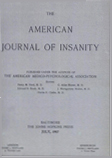THE EFFECT OF TREATMENT ON THE MENTAL LEVEL OF PATIENTS WITH GENERAL PARESIS
Abstract
1. Analysis of the psychometric determinations in 78 cases of general paresis shows that the change in intelligence quotient following treatment is relatively small in the majority of the cases, but there is a little greater likelihood for the intelligence rating to be increased than for it to fall.
2. The greatest increase in intelligence quotient occurred in those patients having an original quotient of between 60 and 90, and the great majority of the cases fell within this range. Patients with an originally relatively high or a very low rating are more likely to show a drop than a rise in the intelligence quotient following treatment.
3. There is suggestive evidence that the psychometric results are better in those patients who had, in the course of their treatment, fever combined with chemotherapy than those who had chemotherapy alone.
4. A comparison of the general clinical results with the psychometric results shows that the ability to return to work depends, in some degree, upon the final level of intelligence; and unless the final intelligence quotient reaches at least 70, the ability to be self-supporting is unlikely. It is also evident that if the original pre-treatment intelligence quotient is much below 70, the likelihood of restoring a patient to working efficiency is relatively slight.
5. It is probable that those patients who have a distinct decrease in their intelligence quotient prior to the beginning of treatment are unlikely to make a good clinical recovery.
6. Delusional trends, if they are well established, interfere with the clinical result even if the final intelligence quotient is high enough and near enough to the original level to presage a satisfactory result.
7. There is relatively little variance in psychometric results in the various mental pictures of the patients in this study, but the euphoric grandiose patients showed a little greater increase in the psychometric rating when this did occur.
8. The psychometric results do not parallel the changes in the spinal fluid, thus corroborating the well established experience that clinical outcome and spinal fluid results show no correlation.
9. If a change in the psychometric rating occurs, it becomes manifest within a few months after treatment, and the level remains relatively stable thereafter.
Access content
To read the fulltext, please use one of the options below to sign in or purchase access.- Personal login
- Institutional Login
- Sign in via OpenAthens
- Register for access
-
Please login/register if you wish to pair your device and check access availability.
Not a subscriber?
PsychiatryOnline subscription options offer access to the DSM-5 library, books, journals, CME, and patient resources. This all-in-one virtual library provides psychiatrists and mental health professionals with key resources for diagnosis, treatment, research, and professional development.
Need more help? PsychiatryOnline Customer Service may be reached by emailing [email protected] or by calling 800-368-5777 (in the U.S.) or 703-907-7322 (outside the U.S.).



